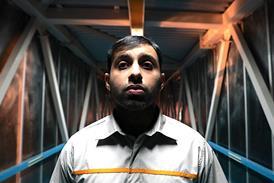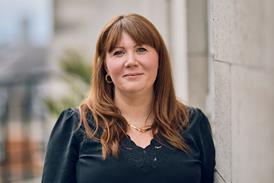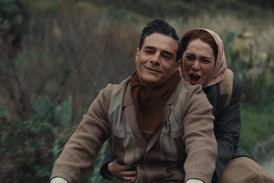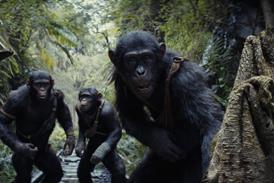Jacob Neiiendam follows the making of Swedish feature Faithless, in competition at this year's Cannes film festival, which Liv Ullmann directed from a script by her former lover Ingmar Bergman.
May 1998
Then 79-year-old Swedish master film-maker Ingmar Bergman meets the media for the first time in 16 years at a press conference where he announces he has written a feature called Faithless (Trolosa) for Swedish actress Lena Endre. "Had she turned down the part, there wouldn't have been a film," says Bergman, who retired from feature directing with the award-winning Fanny And Alexander in 1982, but has continued to write scripts, books and direct for stage and TV. The autobiographical film, which Bergman describes as "a drama of passion, almost a thriller", will be directed by Bergman's long-time collaborator and former lover, Norwegian Liv Ullmann. After acting in more than 50 Swedish and international films, Ullmann moved behind the camera; her credits include Sofie (1992) and Kristin Lavransdatter (1995) from her own screenplay, and the Bergman-scripted Private Confessions (1996) for Swedish broadcaster Sveriges Television (SVT).
Apart from Endre, the rest of the main cast is almost set, with veteran Erland Josephson in the Bergman role, and Thomas Hanzon and Krister Henriksson as the two younger male leads. "If Ingmar had forced me to work with somebody I didn't find right for the film, I would have turned it down," says Ullmann. "But I honestly couldn't imagine anyone else than Lena Endre for the main part, and I would never do a film without Erland Josephson."
SVT Drama, which has backed all Bergman-related projects in the 1990s, also boards the Faithless production. Kaj Larsen, who produced Ullmann's Private Confessions, takes on producing duties. The film is scheduled to shoot in August 1999.
October 1998
Ingmar Bergman delivers the finished script and returns to his secluded life on the small island of Faro off the Swedish coast. In the script, an old film-maker recounts an incident from his past to a young actress. The story unfolds in flashback, about a tragic love triangle which has become a way of life for the three people involved. "I worked with the images the first draft of the script had given me," says Ullmann. "It was amazing and deeply inspiring, but at the same time very complex and dark. Bergman had an idea of doing it all in just one close-up of the woman, but I didn't agree. So we made a deal, that he wouldn't interfere in the storyboard or the post-production. He thought it would be interesting to see somebody else's version of his very personal tale."
Winter-spring 1999
SVT Drama's $3.5m budget gets backing from Norwegian broadcaster NRK, Finnish state broadcaster YLE, Italy's RAI, German ZDF, Classic SRL and Swedish major Svensk Filmindustri (SF), which is handling international sales. Further support comes from the Swedish Film Institute and Nordic Film & TV Fund.
August 1999
Principal photography begins at SVT's studios in Stockholm. The remainder of the cast includes a range of renowned Swedish acting talent - Philip Zanden, Michelle Gylemo, Therese Brunnander, Marie Richardsson, Stina Ekblad - and the relatively unknown Norwegian actress Juni Dahr. The crew is headed by award-winning cinematographer Jorgen Persson, whose credits include My Life As A Dog and Les Miserables and art director Goran Wassberg.
"Everyone was really into this project, and it became a very personal experience for all of us." Ullmann recalls, "Bergman chose me to direct it because I know him so well. That way I could draw on biographical elements that he couldn't bring himself to write in the script, but wanted in the film." The production moves from SVT's studios to shoot on location, first on the streets of Stockholm then on Faro (Bergman leaves for the duration of shooting). Finally a small crew goes to Paris for three days of intensive filming.
"I was really a matter of great trust that helped me through the shoot," Ullmann says. "The story was so difficult, it was hard to explain to the crew, but everyone believed so much in me. We even finished within schedule and under budget. It was amazing."
By the time shooting ends in mid-November, SF has closed sales on most territories.
December 1999
Post-production starts at SVT, featuring newly-recorded classical music. "This is the first time I am truly happy with my craft as a director," a happy Ullmann says, describing the film as one "which will grab your stomach and squeeze it tight - a film about being faithless, and about how the choices you make have grave consequences for other people."
Bergman is one of the first to see the finished cut, and Ullmann is understandably nervous; to her relief, he likes it. "He had been scared that I might have made it too sentimental, but I didn't," she says. "But what was most important for me was the actors' reaction, and luckily they were very happy too."
SF will release the film in Sweden in autumn 2000.
Prod cos: Sveriges Television/SVT Drama. Backers: Svensk Filmindustri, NRK, YLE, Classic SRL, RAI and ZDF, Swedish Film Institute, Nordic Film & TV Fund. Exec prod: Maria Curman. Prod: Kaj Larsen. Dir: Liv Ullmann. Scr: Ingmar Bergman. Main cast: Lena Endre, Krister Henriksson, Thomas Hanzon, Erland Josephson.
PROFILE:
Actor Lena Endre
Endre left Stockholm's drama school in 1987 and quickly made her name on Swedish TV and in the theatre. Her TV and film work includes Daniel Bergman's Sunday's Children and Bille August's The Best Intentions and Jerusalem, for which she picked up a Swedish Guldbagga award as best supporting actress in 1996. She also won critical and popular acclaim for her role in four of Richard Hobert's seven films based on the deadly sins. Endre starred in Ingmar Bergman's TV movie In The Presence Of A Clown in 1997, after which the film-maker wrote Faithless for her; the film marks her second collaboration with director Liv Ullmann after Kristin Lavransdatter (1995).



















No comments yet